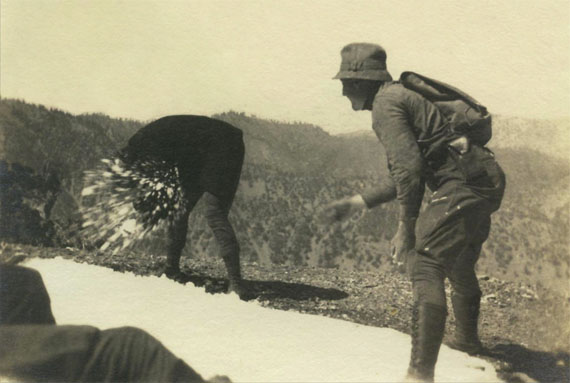
Untitled, ca. 1930
Gelatin silver print, 5.9 x 8.1 cm
Enigma - Every Photograph is an Enigma
Jede Fotografie hat ein Geheimnis
Exhibition: 24 Oct 2015 – 14 Feb 2016
Fri 23 Oct 18:00
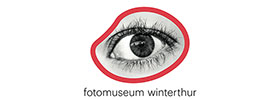
Fotomuseum Winterthur
Grüzenstr. 44+45
8400 Winterthur
+41 (0)52-2341060
info@fotomuseum.ch
www.fotomuseum.ch
Tue, Thu, Fri 11-17; Wed 11-20; Sat-Sun 11-18
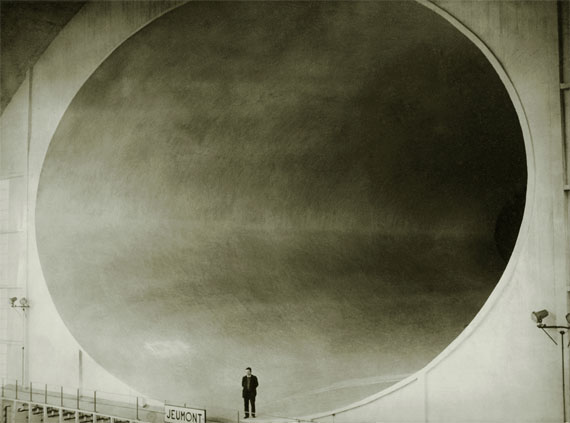
Wind tunnel in Chalais Meudon, 1935
Gelatin silver print, 18 x 24 cm
"Every Photograph is an Enigma"
Exhibition: 24 October – 14 February 2016
Opening: Friday, 23 October, from 6pm
Photographs often seem familiar and understandable, a visual common sense intimately related to our daily lives. But they can also provoke a spark of amazement or generate a more sustained perplexity and inquiry. Curated by the renowned French photo historian, Michel Frizot, Every Photograph is an Enigma interrogates this paradox. Drawing exclusively from photographs in his private collection, many of them anonymous, he presents a selection of photographic moments at once ordinary and marvellous. Frizot develops a system of classification that explores the strangeness generated by the camera lens. Taken by family members, lovers, or unheralded professional and amateur photographers, the assembled images amount to nothing less than a phenomenology of photography.
Immediately a photograph is taken it generates a distance between what the image reveals and what we have seen for ourselves only seconds before. This observation of disparity is central to the phenomenon of photography, creating a sense of indeterminacy that we might describe as the singularity of the photographic. As Frizot himself puts it, "the photograph is not in its essence a transparency through which we gain access to a known reality but, on the contrary, a source of ambiguity and often, perplexity. The photographic image is a constellation of questions for the eye because it offers viewers forms and signs they have never perceived as such and which conflict with their natural vision". Every Photograph is an Enigma draws out the full implications of this disparity, everything which constitutes the singularity of the photographic process. This begins with the selection procedure itself: Frizot has collected the photographs over many years, with no predetermined objective, finding scraps and castoffs at flea markets and jumble sales. Abandoned photographs escape traditional standards of classification and judgement and are often the work of anonymous photographers. For Frizot, this artlessness offers ‘an extra touch of photographic naturalness which is not shrouded in conventions’. It is the work of the exhibition to reveal, and the role of the visitor to discover, this photographic supplement.
The exhibition explores the modalities of photographic capture and the out-distancing of the senses that results, above all in the relationship between photographer, subject photographed and the operations of the camera, a technical device. Recording different intensities of light on a photosensitive surface, photography is an index of states of light rather than the reality perceived by the eye. The formal consequences of photographic technique are considerable, whether determined by exposure time, framing, exhaustive detail, or the projection of three-dimensional space onto a two-dimensional surface. At the same time, what are fundamentally physical processes are also determined by the split-second decisions taken by the camera operator. It is precisely this that gives rise to the puzzle of photography: the contradictions between the precision of a physical world and the decision-making of the photographer.
"Every Photograph is an Enigma" explores other aspects of the riddle of photography, including the complexity of the exchange with the subject of the photograph, embodied by a reciprocal glance. The ability of the camera to record human form and gesture is what lends it its quasi-magical vocation. However, that act of recording is dependent on a vast array of potentialities and constraints, including perhaps the demeanour of the participants. The photographic act transforms emotionally-charged, interpersonal experience into uncertain, interpretable signs, a distillation of affect. At the same time, those signs are also dependent on the astuteness of the eyes that scrutinize the photograph, igniting, perhaps, an empathy with others. A photograph is a fragmentary capture and the gaze of the viewer operates in similarly fragmentary bursts. A viewer’s optical capacities are decisive, interpreting, for example, the photograph’s excess of data. The enigma of photography also emerges from the inadequacies and impasses of the energetic viewer’s scrutiny. These, and many other riddles, are explored across eleven separate chapters in the exhibition, which together provide a method for specifically photographic viewing. They probe the way the photographic device is used to celebrate the subject, or the way that processes unique to photography and the photographer’s command of his or her equipment help determine the final image. A further theme investigates the way that viewers are involved in a perceptual relationship which ordinary vision has not accustomed them to, including a display of stereo images. We encounter the myriad ways that photography overwhelms our senses and the many puzzles it presents.
"Every Photograph is an Enigma" brings together a remarkable selection of everyday photographs, selected over many years by one of the sharpest eyes in the history photography. It offers us the opportunity of a liberated escape into a "pure" photographic act stripped of artistic pretension or historical portent. As Frizot proposes, there are no hierarchies in photography – it is the activity of the gaze that reveals the richness of the image. For the eye, every photograph is an enigma.
Catalogue
The exhibition is accompanied by the fully-illustrated catalogue "Toute photographie fait énigme/Every photography is an enigma", by Michel Frizot, in collaboration with Cédric de Veigy. Published by Éditions Hazan. English/French with a German translation of the main texts. Price 45 CHF.�
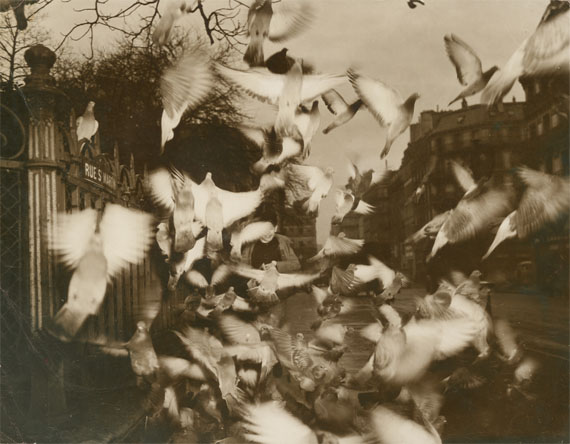
Untitled
Gelatin silver print, 16.5 x 21.5 cm
"Enigma – Jede Fotografie hat ein Geheimnis"
Ausstellung: 24. Oktober 2015 bis 14. Februar 2016
Eröffnung: Freitag, 23. Oktober, ab 18 Uhr
Fotografien wirken meist vertraut und verständlich, sie sind aufs Engste mit unserem tagtäglichen Leben verknüpft. Sie können uns aber auch bestechen – uns erstaunt, betroffen oder gefesselt zurücklassen. "Enigma – Jede Fotografie hat ein Geheimnis" befragt genau dieses Paradox. Vom renommierten französischen Fotohistoriker Michel Frizot kuratiert, zeigt die Ausstellung eine Auswahl seiner über Jahre auf Floh- und Trödelmärkten gesammelten, meist anonymen Fotografien – allesamt gewöhnlich und geheimnisvoll zugleich. Ihre Kunstlosigkeit versteht Frizot als "ein zusätzliches Mass an fotografischer Natürlichkeit, die nicht von Konventionen verschleiert ist." Entlang einer eigens entwickelten Systematik werden jene Sonderbarkeiten untersucht, welche die Kamera hervorbringt. So ergeben die gesammelten Fotografien, von Familienmitgliedern, Geliebten oder unbekannten Profi- und Amateurfotografen geknipst, nichts weniger als eine Phänomenologie der Fotografie.
Das Moment der fotografischen Aufnahme schafft eine Distanz zwischen dem, was das Bild zeigt und dem, was wir selbst nur wenige Sekunden zuvor gesehen haben. Die Wahrnehmung dieser Differenz ist für das Phänomen der Fotografie von zentraler Bedeutung: sie führt zu einem Gefühl von Unbestimmtheit, die man als die Besonderheit des Fotografischen bezeichnen könnte. Nach Frizot ist "die Fotografie nicht so sehr eine Folie, über die wir Zugang zu einer uns bekannten Wirklichkeit erlangen, sondern, im Gegenteil, eine Quelle der Ambivalenz und häufig auch der Verwunderung. Das fotografische Bild richtet Fragen an den Blick, weil es dem Betrachter Formen und Zeichen bietet, die er so nie wahrgenommen hat und die von seinem natürlichen visuellen Register abweichen."
"Enigma – Jede Fotografie hat ein Geheimnis" untersucht die Auswirkungen dieses rätselhaften Dazwischen und richtet den Blick auf die Eigenheiten des fotografischen Prozesses. Dazu gehören die verschiedenen Modalitäten der fotografischen Aufnahme und jene Sinnüberschreitung, die vor allem aus der Beziehung zwischen Fotograf, fotografischem Gegenstand und der Funktionsweise der Kamera resultiert. Belichtungszeit, Ausschnitt, Detailreichtum oder auch die Transformation von dreidimensionalem Raum auf eine zweidimensionale Fläche bestimmen in erheblichem Masse formale Konsequenzen. Gleichzeitig sind die physikalischen Prozesse auch abhängig von den blitzschnellen Entscheidungen des Menschen hinter der Kamera. So führt der Widerspruch zwischen der Genauigkeit einer physischen Welt und der Entscheidungsfindung des Fotografen zum Rätselhaften in der Fotografie.
Enigma untersucht auch die Komplexität des Dialogs mit dem fotografischen Gegenstand, der sich im wechselseitigen Blick verkörpert findet. Der fotografische Akt hat etwas quasi-Magisches: er vermag es, menschliche Formen und Gesten aufzuzeichnen und so emotional aufgeladenes zwischenmenschliches Erleben in ungewisse, interpretationsoffene Zeichen zu verwandeln, in ein Destillat des Affekts. Gleichzeitig sind diese Zeichen auf die Blickschärfe der Augen angewiesen, die das Foto erforschen: Die visuellen Kapazitäten der Betrachter sind ausschlaggebend, wenn es darum geht, die enorme Datenfülle einer Fotografie zu interpretieren. Doch das Rätsel der Fotografie entspringt auch den Unzulänglichkeiten oder dem Gefangensein eines noch so prüfenden und engagierten Blicks. Enigma versammelt eine beeindruckende Auswahl von Alltagsfotografien, über viele Jahre zusammengetragen von einem der schärfsten Beobachter in der Geschichte der Fotografie. In 11 Kapiteln wird erfahrbar, wie die Fotografie die menschlichen Sinne überwältigen kann anhand der vielen Rätsel, die sie uns aufgibt. Die Ausstellung bietet einen befreiten Blick auf einen "reinen" fotografischen Akt, ohne künstlerische Prätention und historische Vorzeichen. Die Fotografie, so Frizot, kennt keine Hierarchien: Es ist der Akt des Schauens, der den Reichtum eines Bildes zum Vorschein bringt. Für das Auge versteckt sich hinter jeder Fotografie ein Geheimnis.
Zur Ausstellung erscheint der reich illustrierte Katalog "Toute photographie fait énigme / Every photography is an enigma", von Michel Frizot, in Zusammenarbeit mit Cédric de Veigy, bei Éditions Hazan. Englisch/Französisch, mit deutschem Beiheft der Haupttexte. Preis 45 CHF.�
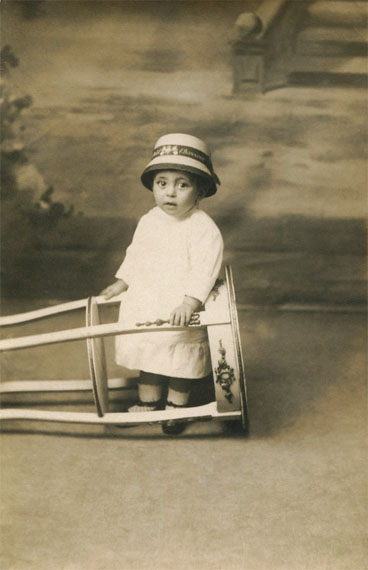
Studio Portrait, ca. 1910
Gelatin silver print, 9 x 14 cm
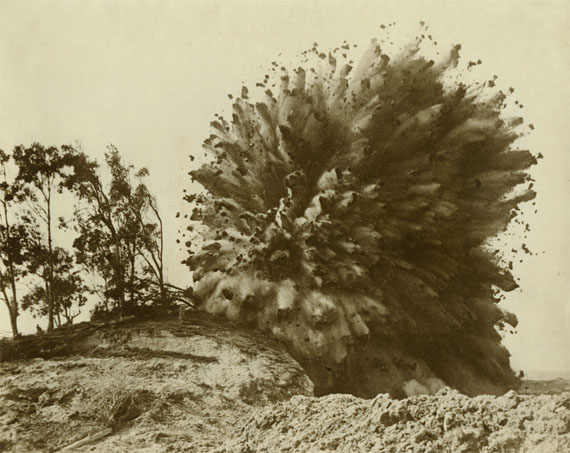
Stones and mud, ˈThe big finalˈ, California, ca. 1930
Gelatin silver print, 19.7 x 24.7 cm